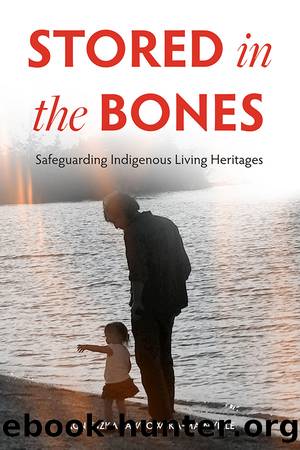Stored in the Bones by Agnieszka Pawłowska-Mainville

Author:Agnieszka Pawłowska-Mainville [Pawłowska-Mainville, Agnieszka]
Language: eng
Format: epub
ISBN: 9781772840483
Publisher: University of Manitoba Press
Published: 2023-09-25T19:41:53+00:00
Special Things
A reader may ask the question, are ICH elements âspecial things for special peopleâ? The answer is both yes and no. Humans have always celebrated special events like births, successes, faith celebrations, and life endings. Today, the crafts, skills, and languages at risk of disappearing are indeed special features of humanityâs diversity and should be protected. However, as some critical heritage scholars point out, all heritage is at risk, and proclaiming heritage to be âat riskâ makes the concept globally and locally discursive. The âat riskâ proclamation acts as a rationalizing vehicle for other agendas that go unchecked.111 As Chapter 1 highlighted, the survival and support of some heritage places, elements, and languages is not entirely accidental. Identity politics, political agendas, and historical or ongoing colonial factors all play a role in decisions around cultural heritage. ICH custodians, notably language speakers whose linguistic expressions are diminishing, would benefit immensely from policy and financial support that ensures survivabilityâthis is evident through the abundant nominations UNESCO receives each year to place on its Representative, in Need of Urgent Safeguarding, and Best Practices lists. The question about âspecial peopleâ accents the sheer fact of rarity and hence makes some ICH holders truly special.
At the same time, effective ICH policy, one that provides consistent and competent transmission, contradicts the notion of specialness. When ICH is thriving, it is not a âspecialâ thing reserved for unique individuals. To illustrate, it is highly doubtful that Canadians are concerned about the state of the English language; with time, many immigrants switch to English as their dominant language, and most countries around the world use English as their language of day-to-day administration. Very few individuals worry about this language disappearing.112
Born of informal social interactions, ICH draws its strength from a coherent body of people whose âhabitusâ is held in living memory, stories, and relationships. It is an array of experiences and âtechniques of the body,â113 sourced from heritage but constantly shaped by history and contrasting circumstances.114 For the akiwenziyag, the symbolic connection between culture and the past is tied to their intellectual traditions, individual experiences, and wisdom in the present. These unique ways must be embedded within the daily life of future generations. One Poplar River Elder, Albert Bittern, shared: âI just do what I was taught [to do]. I was born in 1948. I have lived here for most of my life. I went to residential school for seven years. What the Elders taught us was to respect Nature, that if you take anything, always thank the Creator for giving you that. Thatâs why I always remember to do that. And we have to make sure our youth do that too.â115 The Elder continued, arguing that cultural knowledge is not ânaturalâ anymore because residential schools disrupted that organic process of learning: âMy grandpa taught me that when you cut wood, you just donât go cutting anywhere and that you donât hunt every animal you seeâ¦. The old ones taught me that. I have a pretty good teaching from my grandpa.
Download
This site does not store any files on its server. We only index and link to content provided by other sites. Please contact the content providers to delete copyright contents if any and email us, we'll remove relevant links or contents immediately.
The Vikings: Conquering England, France, and Ireland by Wernick Robert(83269)
Ali Pasha, Lion of Ioannina by Eugenia Russell & Eugenia Russell(40240)
The Conquerors (The Winning of America Series Book 3) by Eckert Allan W(37386)
The Vikings: Discoverers of a New World by Wernick Robert(36974)
Cecilia; Or, Memoirs of an Heiress — Volume 1 by Fanny Burney(32546)
Cecilia; Or, Memoirs of an Heiress — Volume 2 by Fanny Burney(31944)
Cecilia; Or, Memoirs of an Heiress — Volume 3 by Fanny Burney(31929)
Empire of the Sikhs by Patwant Singh(23072)
The Secret History by Donna Tartt(19052)
Hans Sturm: A Soldier's Odyssey on the Eastern Front by Gordon Williamson(18572)
Cat's cradle by Kurt Vonnegut(15334)
Pimp by Iceberg Slim(14488)
Sapiens: A Brief History of Humankind by Yuval Noah Harari(14368)
Talking to Strangers by Malcolm Gladwell(13347)
Norse Mythology by Gaiman Neil(13345)
Leonardo da Vinci by Walter Isaacson(13316)
4 3 2 1: A Novel by Paul Auster(12375)
Underground: A Human History of the Worlds Beneath Our Feet by Will Hunt(12090)
The Radium Girls by Kate Moore(12018)
